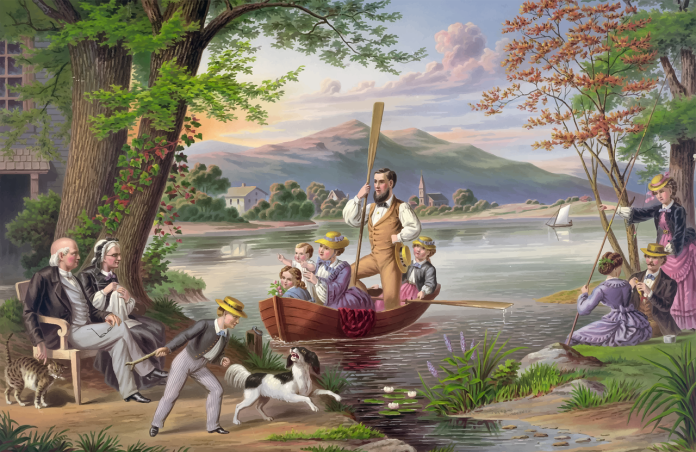“The Evil Genius” by Wilkie Collins: “A Domestic Story” – A Masterpiece of Victorian Sensation Fiction
Introduction to “A Domestic Story”
“The Evil Genius” by Wilkie Collins, a pioneer of the Victorian sensation novel, is a work from 1886 that weaves together intrigue and emotion. This novel, also titled “A Domestic Story,” often overshadowed by his more famous works like “The Woman in White” and “The Moonstone,” deserves its place among the greats of 19th-century literature for its daring exploration of domestic life and social norms. Set against the backdrop of Victorian England, “The Evil Genius” delves into the complexities of marital fidelity, societal expectations, and the moral dilemmas faced by individuals in a rigidly structured society. Collins’s skilful storytelling and deep psychological insights craft a compelling storyline that prompts readers to reconsider the prevailing attitudes of the time. Through his richly developed characters and intricate plot, Collins not only entertains but also provides a critical commentary on the human condition and the societal constraints that shape our lives. As such, “The Evil Genius” remains a timeless work that still strikes a chord with modern readers, offering valuable insights into both the Victorian era and the enduring nature of human relationships.
Plot Overview of “The Evil Genius” by Wilkie Collins
“The Evil Genius” explores and depicts the complexities of marital fidelity, social expectations, and the consequences of personal decisions. The story centres around the marriage of Herbert and Catherine Linley, a couple whose seemingly perfect union is threatened by infidelity and societal pressures. When Herbert becomes romantically involved with a governess named Sydney Westerfield, the stability of his marriage crumbles, leading to a series of dramatic events that challenge the characters’ morals and the Victorian ideals of marriage and family. The narrative unfolds with a series of revelations and confrontations, drawing readers into a world where personal desires clash with societal expectations. The emotional upheaval experienced by the characters is depicted with remarkable depth, highlighting Collins’s ability to capture the essence of human frailty and the impact of individual choices on the fabric of family life.
Themes and Characters
At the heart of the novel is the theme of infidelity and its repercussions. Collins explores the destructive power of an extramarital affair on a marriage, portraying the emotional turmoil and social stigma that follow. The novel also addresses the role of women in Victorian society, mainly through the character of Sydney Westerfield, whose position as a governess highlights the limited opportunities and vulnerability of women in that era. Her history adds depth to her character and emphasises her helpless condition, including the anecdote about her father’s trial and conviction for deliberately sinking his ship to steal a large package of diamonds, adds depth to her character and highlights her helpless condition. Collins’s characters are intricately drawn and psychologically complex. Herbert Linley, torn between duty and desire, embodies the internal conflict that many face in a society governed by strict moral codes. Catherine Linley, the wronged wife, represents the ideal Victorian woman, navigating her pain with dignity and strength. Meanwhile, Mrs Presty, the titular “evil genius” and Catherine’s mother, is depicted with a blend of sympathy and criticism, illustrating Collins’s nuanced approach to his characters. She holds a crucial role in the story’s development, feeling she has to reveal her daughter’s husband’s admiration for the governess. Through these figures, Collins probes themes of morality, societal judgment, and personal redemption, creating a rich tapestry of human experience that resonates with readers. Furthermore, the novel questions whether society should accept a couple who, after being divorced, reconcile and remarry, contributing further complexity to the story.
Social Commentary in “The Evil Genius” by Wilkie Collins
Collins uses “The Evil Genius” to critique the rigid social structures of Victorian England. The novel questions the sanctity of marriage as an institution and exposes the hypocrisies within societal norms. By presenting flawed and multifaceted characters, Collins argues that human emotions and relationships are too complex to be confined by rigid moralistic standards. The novel also sheds light on the precarious position of governesses, who often find themselves in morally and socially ambiguous situations. Sydney Westerfield’s plight is emblematic of the struggles faced by many women who were forced to encounter the blurred lines between servitude and familial integration. Collins’s incisive social commentary not only critiques the era’s moral double standards but also highlights the broader societal pressures that shape individual behaviour. His portrayal of the limitations and injustices faced by women offers a profound critique of the gender dynamics of his time, making “The Evil Genius” a powerful reflection on the social issues that continue to resonate today.
The Evolution of the Sensation Novel
Wilkie Collins was a genius of the sensation novel, a genre that thrived in the mid-to-late 19th century. Sensation novels captivated Victorian readers with their blend of mystery, crime, and domestic drama. “The Evil Genius” embodies these elements, offering a narrative that is both thrilling and thought-provoking. Collins’s ability to weave suspenseful plots with intricate character studies sets him apart from his contemporaries. In “The Evil Genius,” the suspense does not merely stem from the plot twists but from the psychological depth and moral ambiguity of the characters. This novel represents the evolution of sensation novels from mere entertainment to a form that can probe deeper societal issues. Collins’s adept use of suspense, coupled with his exploration of complex moral questions, marks a significant advancement in the genre. His work paved the way for future writers to use popular fiction as a means of engaging with severe social and psychological themes, demonstrating the potential of the sensation novel to offer both entertainment and profound commentary.
Psychological Realism and Moral Complexity in “The Evil Genius” by Wilkie Collins
One of Collins’s strengths in “The Evil Genius” is his use of psychological realism to portray his characters. Unlike the one-dimensional figures often found in lesser works of the genre, Collins’s characters are layered and multifaceted. Herbert Linley’s internal struggle between his sense of duty and his desires reflects a profound understanding of human psychology. Similarly, Sydney Westerfield’s actions, though morally questionable, are presented in a way that elicits both empathy and critique from the reader. Collins does not offer easy answers but rather presents the complexities of moral decisions and their impact on personal and social relationships. His nuanced portrayal of characters’ inner lives enhances the emotional depth of the narrative, making their dilemmas and choices feel authentically human. This psychological realism, combined with the novel’s intricate moral landscape, invites readers to engage deeply with the story and to reflect on their values and beliefs. Collins’s ability to balance empathy and critique in his depiction of flawed characters underscores his skill as a writer and his commitment to exploring the multifaceted nature of human experience.
Critique of Victorian Morality
Collins was not just a storyteller but also a keen observer of the social mores of his time. “The Evil Genius” serves as a pointed critique of Victorian morality, particularly the hypocrisy surrounding gender and sexuality. The novel highlights how women like Catherine Linley and Sydney Westerfield suffer disproportionately from the consequences of actions that society often forgives in men. Collins exposes the harsh realities faced by women who transgress societal norms, thereby questioning the fairness and integrity of those norms. His critique extends to the institution of marriage itself, suggesting that it often traps individuals in roles that stifle their true selves and lead to unhappiness and deceit. By challenging the accepted moral standards of his day, Collins encourages readers to question the societal values and norms that dictate behaviour. His exploration of these themes remains relevant, offering a critical perspective for examining contemporary issues of gender equality and moral judgment. “The Evil Genius” thus stands as a powerful display of Collins’s ability to engage with social issues and to provoke thoughtful reflection among his readers.
Narrative Techniques and Style in “The Evil Genius” by Wilkie Collins
Collins’s narrative technique in “The Evil Genius” is marked by a keen attention to detail and a deft use of suspense. He employs a third-person omniscient narrator and epistolary style, which allows readers insight into the thoughts, emotions, and motivations of multiple characters. This approach enhances the novel’s psychological depth and complexity. Collins also uses letters and legal documents within the narrative, a technique that adds realism and a sense of immediacy to the unfolding drama. His style, characterised by clear, concise prose and a strong narrative drive, ensures that the story remains engaging and accessible while probing deep ethical and social questions. By interweaving different narrative forms, Collins creates a rich and immersive reading experience that captures the multifaceted nature of the characters’ lives and the societal pressures they face. His ability to blend various narrative techniques highlights his innovation as a writer and his commitment to crafting a compelling and thought-provoking story. The clarity and precision of his prose further underscore his mastery of the genre, making “The Evil Genius” a standout work in his literary repertoire.
Legacy and Modern Relevance
Upon its publication, “The Evil Genius” received mixed reviews. Some critics praised Collins for his daring subject matter and intricate plotting, while others criticised the novel for its perceived moral ambiguity and sensationalism. However, modern readers and scholars have come to appreciate the novel’s depth and its bold exploration of themes that were considered taboo in the Victorian era. “The Evil Genius” continues to be relevant in contemporary discussions about the institution of marriage, gender roles, and societal expectations. Modern readers can draw parallels between the struggles of Collins’s characters and current debates about the nature of fidelity, the balance of power within relationships, and the judgment of women’s choices. The novel’s exploration of these timeless themes ensures its place in the canon of literature that transcends its era. Collins’s work, with its blend of sensationalism and severe social critique, prefigures the psychological thrillers and domestic dramas that are popular today. His skilful storytelling and keen insight into human nature continue to captivate readers, making “The Evil Genius” a significant, though often overlooked, part of his literary legacy. As discussions around these themes evolve, Collins’s work remains a touchstone for understanding the complexities of human relationships and societal norms.
Conclusion
In conclusion, “The Evil Genius” by Wilkie Collins embodies and represents the enduring power of Victorian sensation fiction. Through its intricate plot and deeply developed characters, the novel explores themes of infidelity, societal expectations, and the moral dilemmas faced by individuals. Collins’s ability to blend psychological realism with social critique makes “The Evil Genius” a compelling, insightful and enlightening read. Despite initial mixed reviews, modern readers and scholars recognise its significant contributions to discussions about marriage, gender roles, and societal norms. Collins’s work remains relevant today, offering valuable insights into the human condition and the complexities of relationships, thereby securing its place in the literary canon. “The Evil Genius” continues to retain relevance, proving that the issues Collins addressed are as pertinent now as they were in the Victorian era.





